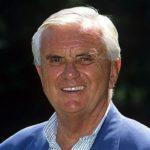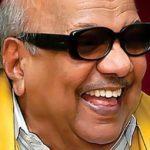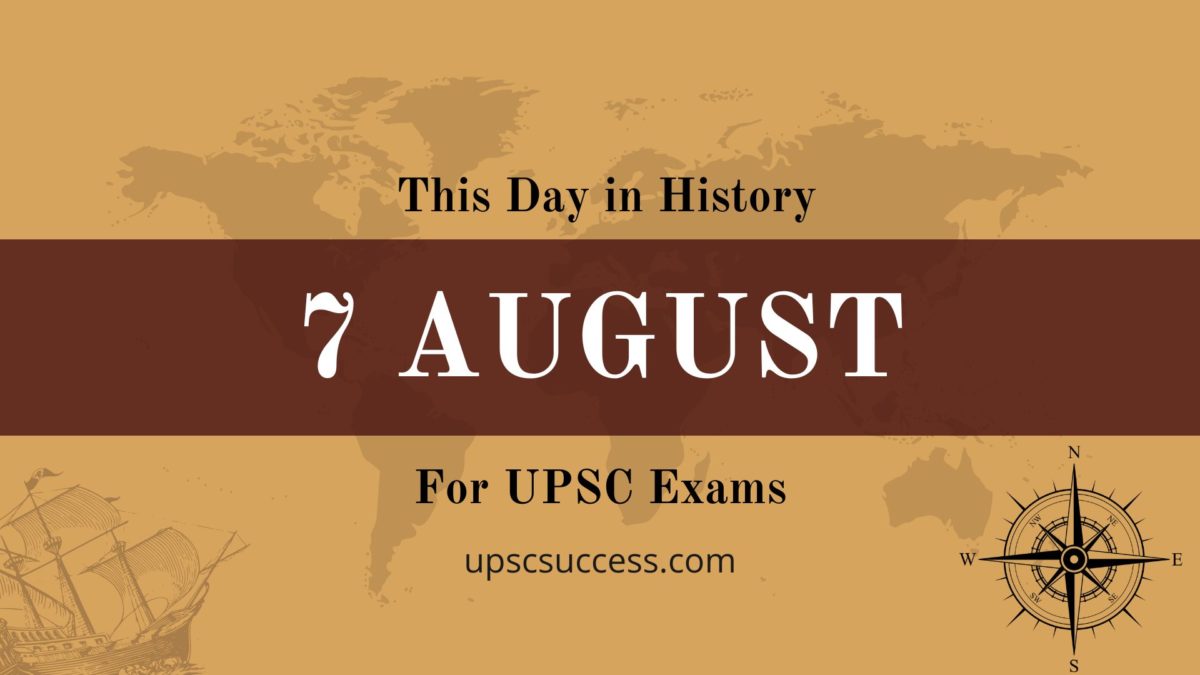Contents
This Day in History on 7 August
The historical events hold a lot of value for aspirants who are sitting for UPSC competitive exams including the IAS Exam.
On this page, we will list all historical events that occurred on 7 August. The students can refer them while preparing for all competitive exams and banking exams.
Important Days
–
Important Events
1786: The first federal Indian Reservation is created by the United States.
1791: American troops destroy the Miami town of Kenapacomaqua near the site of present-day Logansport, Indiana in the Northwest Indian War.
1905: Indian National Congress declared to boycott the British goods for the first time against Bengal partition, and also advocated to buy ‘ Swadeshi.
1905: The first political documentary ootage was the Great Bengal Partition Movement: Meeting and Procession shot by Jyotish Sarkar and Jamshedji F. Madan in Calcutta.
1906: First Tricoloured National Flag consisting of Green, Yellow and Red, with eight Lotuses on the top, second strip carrying “Vande Matara” in Devnagri and the third strip having Sun and Cresent Moon, was hoisted at Green Park in Calcutta by Surendranath Banerjee.
1930: The last confirmed lynching of blacks in the Northern United States occurs in Marion, Indiana; two men, Thomas Shipp and Abram Smith, are killed.
1934: Gandhi begins a fast for penance following the violent treatment of a Hindu leader by some of his followers.
1942: World War II – US troops landed at the Guadalcanal in the Pacific Ocean, and a fierce battle ensued in World War II. This incident marked the beginning of Japan’s withdrawal.
1947: Mumbai Municipal Corporation acquired BEST (Bombay Electricity Supply and Transport) Company.
1969: Richard Nixon appoints Luis R. Bruce, a Mohawk-Oglala Sioux and co-founder of the National Congress of American Indians, as the new commissioner of the Bureau of Indian Affairs.
1980: Mother Teresa visits the poor in Bronx at New York.
1981: ‘The Washington Star’ closed after 128 consecutive years of publication.
1985: Geet Sethi, national champion, was the third Indian to become World Amateur Billiards Champion by beating Robert Marshal of Australia.
1986: Lok Sabha passes Constitution 53rd Amendment bill conferring statehood on Mizoram.
1987: Lynn Cox became the first person to swim from the United States to the Soviet Union.
1988: N. T. Ramarao elected chairman and V.P. Singh the convenor of the National Front.
1990: First American soldiers arrived in Saudi Arabia as part of the Gulf War.
1990: Govt. of India accepts the Mandal Commission’s recommendations and decides to reserve 27% jobs for the backward classes. Violent protests rock parts of Northern India against Mandal Commission.
1990: Union Cabinet approves setting up of Indian Broadcasting (Programme) Service.
1991: The Prithvi missile was successfully tested for the third time at Sriharikota.
1993: Ada Deer, a Menominee activist, sworn in as the head of the Bureau of Indian Affairs.
1998: The Government announces a banking and foreign exchange package for development of the information technology and software industry following the recommendations of the National Task Force.
1999: A. B. Vajpayee, Prime Minister, appeals to the United States to name Pakistan as a terrorist state.
Birth/Birth Anniversary
1868: Pratham Chaudhary (Birbal), modern Bengali poet and critic, was born.

1871: Abanindranath Tagore, the principal artist and creator of the “Indian Society of Oriental Art”.
1876: Mata Hari, a Dutch exotic dancer, and courtesan.
1887: Kasturi Shriniwas Iyengar, politician and journalist, was born.
1924: Kenneth Kendall, Indian-English journalist and actor (d. 2012)
1925: Monkombu Sambasivan Swaminathan was born in Kumbakonam. He went to Britain and took his Ph.D from the school of Agriculture in Cambridge in 1952. He developed high yielding strains of wheat and rice and accomplished difficult crosses in potato and jute species. In 1971, he was awarded The Ramon Magsaysay Award for generating a new confidence in the agricultural capabilities of the country. He was the Director of the International Rice Research Institute, Philippines. He is also the first agriculture scientist to win the Albert Einstein world science Award in 1986.

1925: Keshto Mukherjee, an Indian film actor, and comedian.
1948: Greg Chappell, a former Australian cricketer.
1955: Suresh Wadkar, an Indian playback singer.
1966: Jimmy Wales, co-founder of the online non-profit encyclopedia Wikipedia.
1988: Anisa Mohammed, West Indian cricketer

Death/ Death Anniversary
1888: Navalram Pandya, a Gujarati critic, playwright, poet, essayist, editor, educationist and social reformer.
1941: Rabindranath Devendranath Tagore “Gurudev”, great Indian poet, voluminous playwright, Noble Laureate, social reformer, freedom fighter, painter and philosopher, passed away at Calcutta at the age on 80 years. He will be always remembered for the national song “Jana Gana Mana” and as a founder of Vishwa Bharati, Shantiniketen, etc.

1974: Anjanibai Malpekar, a noted Indian classical singer.
1982: Krishnakanta Radhakant Handique, linguist, educationist, Sanskrit scholar, principal of J.B. College and Padma Bhushan awardee, passed away. He also authored the learned works ‘Naisadhacarita’, ‘Yasastilaka and Indian Culture’ etc. His original treatise written in Sanskrit by Somaveda in the 10th century is an encyclopedic work dealing with Jainism and Indian thoughts and culture.
2009: Gulshan Bawra, an Indian songwriter and actor.
2018: M. Karunanidhi, Indian politician, former Tamil Nadu Chief Minister and prominent leader of Tamils (b. 1924)

